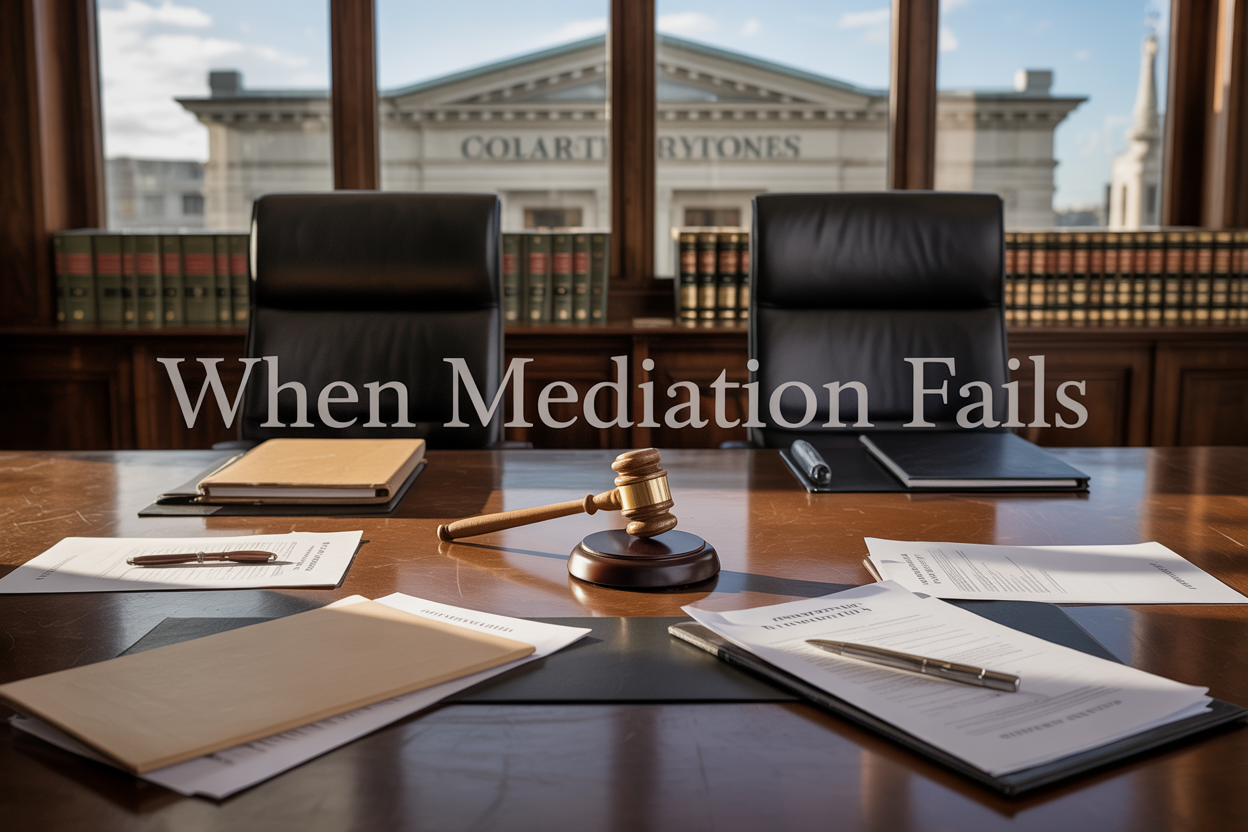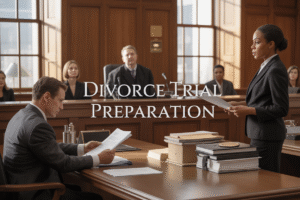Divorce mediation doesn’t always work, even with the best intentions from both sides. When mediation doesn’t work, many couples find themselves facing a complex reality: litigation may be their only path forward.
This guide is for divorcing spouses who’ve hit roadblocks in mediation and need to understand when court intervention becomes necessary. You’ll discover the key warning signs of divorce mediation breakdown, learn about complex situations that require contested divorce proceedings, and explore how litigation can better protect your legal rights when cooperation breaks down.
We’ll cover the specific scenarios that lead to failed mediation divorce cases, including high-conflict situations and financial complexities that courts handle more effectively than mediators. You’ll also learn the strategic advantages of divorce litigation vs mediation and how to prepare for the transition when mediation reaches its breaking point.
Understanding When Mediation Reaches Its Breaking Point
Recognizing the Warning Signs of Failed Communication
When couples can’t have productive conversations about their divorce terms, mediation quickly becomes pointless. Watch for repeated patterns where discussions end in arguments, where one or both parties shut down completely, or where the same issues keep coming up without any progress. If your spouse consistently refuses to share financial information, dodges direct questions, or turns every topic into a blame game, these are red flags that divorce mediation failure is imminent.
Communication breakdown also shows up when one person dominates the conversation while the other withdraws. Maybe your spouse talks over the mediator, refuses to acknowledge your concerns, or storms out when they don’t get their way. Sometimes the problem is subtler – like when someone agrees during sessions but later claims they never understood what they agreed to. These patterns signal that when mediation doesn’t work, it’s time to consider other options.
Identifying Irreconcilable Differences in Core Issues
Some disagreements run so deep that no amount of compromise can bridge the gap. Child custody arrangements often create these impossible situations, especially when parents have completely different philosophies about raising kids. One parent might insist on homeschooling while the other demands public school. One wants the children to follow strict religious practices, while the other prefers a secular upbringing.
Property division can also hit these immovable walls. When one spouse wants to keep the family home at all costs while the other demands it be sold immediately, there’s no middle ground that satisfies both parties. Business ownership disputes frequently fall into this category, too. Suppose you built a company together but can’t agree on whether to sell it, divide it, or have one person buy out the other. In that case, mediation might not be able to resolve such fundamental differences about your financial future.
Understanding When Emotional Barriers Become Insurmountable
High-conflict divorce situations often involve emotions that make rational discussion impossible. Betrayal from infidelity, years of built-up resentment, or feelings of being financially deceived can create emotional walls that mediation can’t break through. When one or both spouses are still processing deep hurt, anger, or feelings of abandonment, they might not be ready for the collaborative approach that mediation requires.
Some people use mediation sessions as opportunities to continue old fights rather than solve problems. They bring up past grievances, make accusations, or try to punish their spouse emotionally. Others might be dealing with untreated mental health issues, substance abuse problems, or personality disorders that make good-faith negotiation nearly impossible. When emotions consistently derail every attempt at productive discussion, contested divorce proceedings through litigation might be the only path forward.
Assessing Power Imbalances That Prevent Fair Negotiation
Mediation assumes both parties can advocate for themselves equally, but this isn’t always realistic. Financial power imbalances are common culprits – when one spouse controlled all the money during the marriage, the other might not even know what assets exist or understand their actual value. The financially dependent spouse might agree to unfavorable terms to end the process quickly, especially if they’re worried about paying for extended mediation.
Educational differences can create similar problems. A spouse with advanced business knowledge might easily manipulate complex financial discussions, while their partner feels lost and overwhelmed. Physical intimidation, even subtle forms, can also poison the mediation environment. If one spouse has a history of controlling or aggressive behavior, the other might agree to unreasonable demands out of fear rather than genuine consent.
Sometimes the power imbalance comes from different comfort levels with conflict. One person might be naturally assertive and skilled at negotiation, while their spouse avoids confrontation at all costs. This dynamic can lead to agreements that look consensual on paper but actually reflect one person’s inability to stand up for their own interests. When these imbalances can’t be corrected through the mediation process itself, court intervention and divorce become necessary to ensure both parties receive fair treatment and protection of their legal rights.
Common Scenarios That Make Mediation Ineffective
Domestic Violence and Safety Concerns
When domestic violence enters the picture, mediation becomes not just ineffective but potentially dangerous. The collaborative nature of mediation requires both parties to negotiate in good faith, but abusive partners often use this setting to continue patterns of control and intimidation. Victims may feel pressured to agree to unfavorable terms simply to end the process quickly and escape continued exposure to their abuser.
The power imbalance inherent in abusive relationships makes it nearly impossible to achieve fair outcomes through mediation. Mediators, despite their training, cannot adequately address the psychological manipulation and fear tactics that abusers employ during sessions. Safety concerns extend beyond physical violence to include emotional abuse, financial coercion, and threats against children or family members.
Court intervention becomes essential when protective orders are needed or when there’s documented evidence of abuse. Judges have the authority to impose safety measures, supervised exchanges for child custody, and other protections that mediation cannot provide. The formal court process also creates an official record of abuse allegations, which becomes critical for future legal proceedings and enforcement actions.
Hidden Assets and Financial Dishonesty
Financial transparency forms the foundation of successful mediation, but when one spouse deliberately conceals assets or provides false financial information, the entire process collapses. Complex divorce litigation becomes necessary when dealing with sophisticated asset hiding schemes, offshore accounts, or businesses structured specifically to shield wealth from divorce proceedings.
Mediators lack the legal authority to compel financial disclosure or conduct forensic accounting investigations. They cannot subpoena bank records, depose financial advisors, or freeze assets to prevent dissipation. When divorce mediation fails due to financial dishonesty, litigation provides the discovery tools necessary to uncover hidden wealth.
Courts can order asset freezes, appoint forensic accountants, and impose severe penalties for contempt when spouses refuse to comply with disclosure orders. The formal discovery process in litigation includes depositions, document production requests, and expert witness testimony that can expose even the most elaborate asset protection schemes. These investigative powers are absolutely crucial when dealing with high-net-worth divorces or situations where one spouse has exclusive control over complex financial portfolios.
High-Conflict Personalities and Narcissistic Behavior
Certain personality disorders make mediation virtually impossible. Narcissistic individuals often view compromise as weakness and use mediation sessions as opportunities to manipulate, blame, and control their ex-spouse. They may agree to settlements during mediation only to sabotage implementation later, creating endless cycles of failed agreements.
High-conflict divorce situations involving personality disorders require the structure and authority that only litigation can provide. These individuals often respond only to direct court orders backed by enforcement mechanisms. They manipulate informal processes like mediation but tend to comply when faced with judicial authority and potential contempt sanctions.
When mediation doesn’t work due to personality conflicts, litigation provides clear boundaries and consequences. Judges can limit direct communication between parties, establish specific timelines for compliance, and impose sanctions for obstructive behavior. The formal court process also creates detailed records of problematic conduct, which become essential for future modifications or enforcement actions.
Child Custody Disputes Involving Serious Allegations
When child custody disputes involve allegations of abuse, neglect, substance abuse, or parental alienation, mediation lacks the investigative tools and protective authority necessary to safeguard children’s interests. These serious allegations require court intervention to order psychological evaluations, home studies, substance abuse testing, and appointment of guardians ad litem to represent children’s best interests.
Contested divorce proceedings become essential when one parent poses a genuine risk to children’s safety or well-being. Courts can order supervised visitation, require completion of parenting classes or therapy, and establish detailed custody arrangements with built-in safety protections. The formal litigation process also allows for expert witness testimony from child psychologists, social workers, and other professionals who can provide crucial insights into family dynamics.
Complex divorce litigation provides the comprehensive framework needed to address serious child welfare concerns that go far beyond what mediation can handle. The court’s authority to investigate allegations thoroughly and implement protective measures makes litigation the only viable option when children’s safety and well-being are at stake.
Financial Complexities That Require Court Intervention
Complex business valuations and ownership disputes
Business ownership creates some of the most challenging financial puzzles in divorce proceedings. When spouses own companies together or have competing claims about business value, mediation often breaks down completely. Professional valuators might disagree on methodology, with one spouse claiming a business is worth millions while the other insists it’s barely profitable.
Consider cases involving professional practices like medical clinics or law firms. These businesses often have intangible assets, such as client relationships, reputation, and specialized licenses, that are incredibly difficult to value. When mediation doesn’t work for these complex situations, courts must step in with subpoena power to obtain financial records and expert testimony from certified business appraisers.
Partnership disputes add another layer of complexity. If one spouse owns 40% of a company while maintaining operational control, determining fair compensation becomes nearly impossible through mediation alone. Courts can order forensic accounting, examine years of business records, and evaluate management agreements that mediators cannot enforce.
International assets and jurisdictional challenges
Cross-border financial holdings create a maze of legal complications that mediators cannot navigate. When spouses hold assets in multiple countries, determining which court has authority becomes critical. Swiss bank accounts, Canadian real estate, or offshore investment accounts require specialized legal procedures that mediation cannot address.
Currency fluctuations, international tax implications, and foreign asset reporting requirements demand expert legal intervention. A mediator cannot compel foreign banks to provide account statements or enforce asset freezing orders across international boundaries. Only formal court proceedings can trigger international legal assistance treaties and diplomatic channels necessary for asset recovery.
Failed mediation divorce cases often involve hidden international assets discovered during litigation. Courts possess investigative powers to trace funds through complex offshore structures, while mediators rely entirely on voluntary disclosure. When one spouse suspects assets are hidden in foreign jurisdictions, court intervention in a divorce becomes the only viable path forward.
Pension and retirement benefit complications
Retirement benefits present unique valuation and division challenges that frequently overwhelm mediation processes. Military pensions, federal employee retirement systems, and complex 401(k) arrangements often require specialized actuarial analysis. When spouses disagree about present value calculations or survivor benefit elections, contested divorce proceedings become necessary.
ERISA-governed retirement plans have strict federal requirements for division orders. Qualified Domestic Relations Orders (QDROs) must meet precise legal standards that mediation agreements cannot guarantee. Plan administrators routinely reject improperly drafted QDROs, forcing couples back to court anyway.
Public employee pension systems add state-specific complications. Teacher retirement systems, police pensions, and municipal employee benefits each have unique rules about division, early retirement penalties, and beneficiary designations. These complex divorce litigation scenarios require attorneys familiar with specific pension regulations that mediators typically lack the expertise to handle correctly.
Protecting Your Legal Rights Through Litigation
Ensuring Proper Discovery of All Marital Assets
When divorce mediation breaks down, litigation provides powerful tools to uncover hidden assets that one spouse might be concealing. During contested divorce proceedings, the court can compel full financial disclosure through formal discovery processes that mediation cannot enforce. Subpoenas, depositions, and interrogatories become your allies in tracking down bank accounts, investments, business interests, or property that your spouse may have attempted to hide.
The litigation process enables attorneys to review financial records dating back several years, analyze spending patterns, and identify discrepancies that suggest asset concealment. This thorough investigation becomes particularly crucial in complex divorce litigation involving substantial wealth or business ownership. Unlike mediation, where cooperation is voluntary, litigation forces transparency through legal consequences for non-compliance.
Securing Enforceable Court Orders
Court orders carry the full weight of judicial authority, making them significantly more potent than mediated agreements when it comes to enforcement. When mediation doesn’t work and spouses demonstrate unwillingness to honor their commitments, litigation becomes necessary to protect your interests. A judge’s ruling creates legally binding obligations that can be enforced through contempt of court proceedings, wage garnishment, asset seizure, and other powerful remedies.
This enforceability extends beyond initial divorce settlements. If your ex-spouse refuses to pay spousal support, transfer property, or comply with custody arrangements, court orders provide immediate legal recourse. The threat of jail time and substantial penalties typically motivates compliance far more effectively than any mediated agreement could achieve.
Establishing Precedent for Future Modifications
Litigation creates a detailed legal record that becomes invaluable for future divorce legal rights protection. Court orders include specific findings of fact and legal reasoning that establish precedent for any future modifications or enforcement actions. This comprehensive documentation proves essential when circumstances change and you need to modify support, custody, or property arrangements.
The evidentiary record created during litigation provides a solid foundation for future legal proceedings. Expert testimony, financial documentation, and judicial findings become part of the permanent court record, making it easier to demonstrate changed circumstances or defend against frivolous modification requests. This level of legal protection doesn’t exist with informal mediation agreements.
Obtaining Expert Testimony for Complex Valuations
High-conflict divorce cases often involve complex assets requiring professional expertise to value accurately. Litigation allows you to present expert witnesses who can testify about business valuations, real estate appraisals, pension calculations, and other specialized financial matters. These experts provide crucial testimony that helps judges understand complicated financial situations and make informed decisions.
Business owners, professionals with complex compensation structures, or couples with significant investment portfolios benefit tremendously from expert testimony during court-intervention divorce proceedings. Forensic accountants can trace financial transactions, business appraisers can determine the fair market value of enterprises, and actuaries can calculate the present value of retirement benefits. This expert analysis ensures that marital assets are divided fairly based on accurate valuations rather than guesswork or manipulation.
Strategic Advantages of Choosing Litigation Over Mediation
Access to Court-Ordered Investigations and Evaluations
When divorce mediation breaks down, litigation opens doors to professional investigations that mediation cannot provide. Courts have the authority to order custody evaluations, forensic accounting examinations, and property appraisals by neutral third-party experts. These court-appointed professionals possess specialized training and legal authority that mediators lack.
Custody evaluations become particularly valuable in high-conflict divorce situations where parenting capabilities are disputed. Licensed psychologists and social workers conduct comprehensive assessments, interview family members, and observe parent-child interactions. Their detailed reports carry significant weight in judicial decisions, something that informal mediation discussions cannot match.
For complex financial situations, courts can order forensic accountants to trace hidden assets, analyze business valuations, and uncover income manipulation tactics. These professionals have access to sophisticated investigative tools and databases that reveal financial information one spouse might be concealing during failed mediation divorce proceedings.
Subpoena Power for Gathering Critical Evidence
Litigation provides powerful discovery tools that mediation cannot offer. Subpoena power allows your attorney to compel the production of documents, bank records, employment files, and other critical evidence. When your spouse refuses to provide a complete financial disclosure during mediation, court intervention in divorce proceedings can force transparency.
Third parties can also be subpoenaed to provide testimony or documents. Banks, employers, business partners, and other relevant parties must comply with court orders, creating a comprehensive evidence-gathering process. This becomes essential when dealing with complex divorce litigation involving business ownership, professional practices, or sophisticated investment portfolios.
The formal discovery process includes depositions where witnesses must answer questions under oath. This sworn testimony creates a permanent record and prevents parties from changing their stories later, something that informal mediation conversations cannot guarantee.
Protection Through Formal Legal Procedures
Court proceedings provide structured protections that mediation lacks. Judicial oversight ensures both parties receive due process and equal treatment under the law. When mediation doesn’t work due to power imbalances or intimidation tactics, the formal court environment levels the playing field.
Judges can issue protective orders, temporary restraining orders, and emergency custody arrangements when safety concerns arise. These immediate protections are unavailable through mediation processes, making contested divorce proceedings necessary for vulnerable spouses.
The formal rules of evidence protect parties from unreliable information or manipulative tactics. Courts operate under established legal standards that ensure fair treatment, while mediation relies on voluntary compliance and good faith participation from both sides.
Appeals Process for Unfavorable Decisions
Perhaps the most significant advantage of divorce litigation vs mediation is the right to appeal unfavorable decisions. Trial court rulings can be challenged through the appellate system, providing a second chance for justice when errors occur. Mediation agreements, once signed, typically cannot be appealed or modified unless fraud or duress can be proven.
The appeals process allows higher courts to review legal errors, procedural mistakes, or inappropriate judicial decisions. This safety net becomes crucial in high-stakes divorces involving substantial assets, complex custody arrangements, or significant alimony determinations.
Appellate courts can order new trials, modify awards, or correct legal interpretations that negatively impacted the initial decision. This multi-layered judicial review system provides comprehensive protection of divorce legal rights that mediation cannot offer, making litigation the necessary choice when substantial interests are at stake.
Preparing for the Transition from Mediation to Court
Documenting Failed Mediation Attempts
Creating a thorough record of your failed mediation divorce attempts becomes crucial evidence when you move to litigation. Courts want to see that you made genuine efforts to resolve disputes outside the courtroom before requesting judicial intervention. Save all emails, text messages, and written communications between mediators, attorneys, and your spouse that demonstrate the breakdown in negotiations.
Document specific instances when your spouse refused to cooperate, made unreasonable demands, or failed to provide required financial information. Note dates, times, and witnesses present during failed mediation sessions. Record any instances of intimidation, threats, or hostile behavior that made productive mediation impossible. Keep receipts for mediation fees and canceled sessions to show your financial investment in the process.
Your documentation should tell a clear story about why the mediation breakdown occurred and why court intervention became necessary for your contested divorce proceedings. This evidence helps justify the additional time and expense of litigation to the judge.
Gathering Evidence That Supports Litigation Necessity
Building a compelling case for why your high-conflict divorce requires litigation means collecting specific evidence that mediation cannot address. Financial documents that prove hidden assets, complex business valuations, or fraudulent transfers require professional forensic analysis, which mediation typically cannot provide.
Collect evidence of domestic violence, substance abuse, or mental health issues that create safety concerns or impair decision-making capacity. Screenshots of threatening messages, police reports, medical records, and witness statements strengthen your position for court protection.
Document patterns of non-compliance with temporary orders or mediation agreements. If your spouse consistently violates parenting schedules, fails to pay support, or refuses to follow court directives, this evidence shows why voluntary cooperation through mediation won’t work.
Gather proof of complex custody issues requiring expert evaluation, such as parental alienation concerns, relocation disputes, or special needs considerations. Professional evaluations from child psychologists, custody evaluators, or educational specialists provide expert testimony that courts rely on for difficult custody decisions.
Building a Strong Legal Team
Transitioning from mediation to litigation requires assembling experienced professionals who understand complex divorce litigation. Your primary divorce attorney should have extensive courtroom experience handling contested cases similar to yours. Look for lawyers with specific expertise in your key issues, whether that’s complex property division, high-conflict custody battles, or business valuation disputes.
Consider adding specialist attorneys to your team for specific challenges. Family law attorneys who focus on domestic violence cases, tax attorneys for complex financial situations, or child custody specialists can provide targeted expertise. Forensic accountants become essential when dealing with hidden assets, business valuations, or complex income streams.
Your legal team might also include expert witnesses such as child psychologists, property appraisers, vocational evaluators, or financial analysts. These professionals provide objective testimony that courts rely on when making decisions regarding custody, support, and property division.
Establish clear communication protocols with your legal team about strategy, costs, and decision-making authority. Regular case conferences help coordinate efforts and prevent duplicated work, which can drive up expenses.
Setting Realistic Expectations for Timeline and Costs
Contested divorce proceedings typically take 12-24 months from filing to final judgment, significantly longer than mediation timelines. Complex cases involving business valuations, custody disputes, or extensive discovery can extend beyond two years. Courts have crowded dockets, and scheduling hearings, depositions, and trials requires working around judicial calendars.
Legal fees for litigation often range from $15,000 to $50,000 per party, with complex cases costing significantly more. Expert witness fees, court costs, and discovery expenses add substantial additional costs. Budget for forensic accountants ($5,000-$15,000), child custody evaluators ($3,000-$8,000), and property appraisers ($500-$2,000 per asset).
Plan for emotional costs alongside financial expenses. Litigation creates ongoing stress, requires multiple court appearances, and often prolongs conflict between spouses. The adversarial nature of court proceedings can strain relationships with children and extended family members.
Understanding these realities helps you make informed decisions about when litigation becomes necessary despite its costs and challenges.
Managing Emotional Preparation for Adversarial Proceedings
Moving from collaborative mediation to adversarial litigation requires significant emotional adjustment. Court proceedings involve formal rules, cross-examination, and public records that feel dramatically different from private mediation sessions. Prepare mentally for depositions where opposing counsel will question you under oath about personal and financial matters.
Develop coping strategies for courtroom stress through counseling, support groups, or therapy. Many people find individual therapy helpful for processing the emotional challenges of divorce and legal rights protection while maintaining focus on long-term goals.
Practice emotional regulation techniques for court appearances and depositions. Courts expect professional behavior regardless of personal animosity. Learning to stay calm under pressure helps you present credible testimony and make good decisions during proceedings.
Build a support network of family, friends, and professionals who understand litigation challenges. Consider joining divorce support groups where others share experiences with contested proceedings. Your legal team should also include emotional support through regular communication and realistic updates about case progress.
Protect your children from litigation stress by maintaining regular routines and avoiding discussions about court proceedings. Focus on their emotional needs rather than using them as allies or sources of information about your spouse’s activities.
Mediation offers a peaceful path forward for many divorcing couples, but recognizing when it’s not working can save you time, money, and emotional energy. Complex financial situations, uncooperative spouses, or situations involving abuse can’t be resolved through collaborative discussion alone. When one party refuses to negotiate in good faith or when significant assets need proper legal protection, the courtroom becomes your best option for achieving a fair outcome.
Moving from mediation to litigation isn’t a failure—it’s a strategic decision that puts your rights first. The court system provides the structure and authority needed to handle complicated cases that mediation can’t address. If you’re facing roadblocks in mediation or dealing with a spouse who won’t cooperate, don’t hesitate to speak with an experienced divorce attorney who can guide you through the litigation process and fight for the settlement you deserve.
Lass Law offers dedicated advocacy for families navigating life’s most personal legal matters. Our Divorce & Family Law Attorneys in North County San Diego bring both skill and compassion to every case. Whether you’re seeking support from a Family Law Attorney in Oceanside, working through Divorce Law issues, or consulting with a Family Law Attorney in Vista, we stand ready to protect your interests. Explore our full range of Family Law services today.






